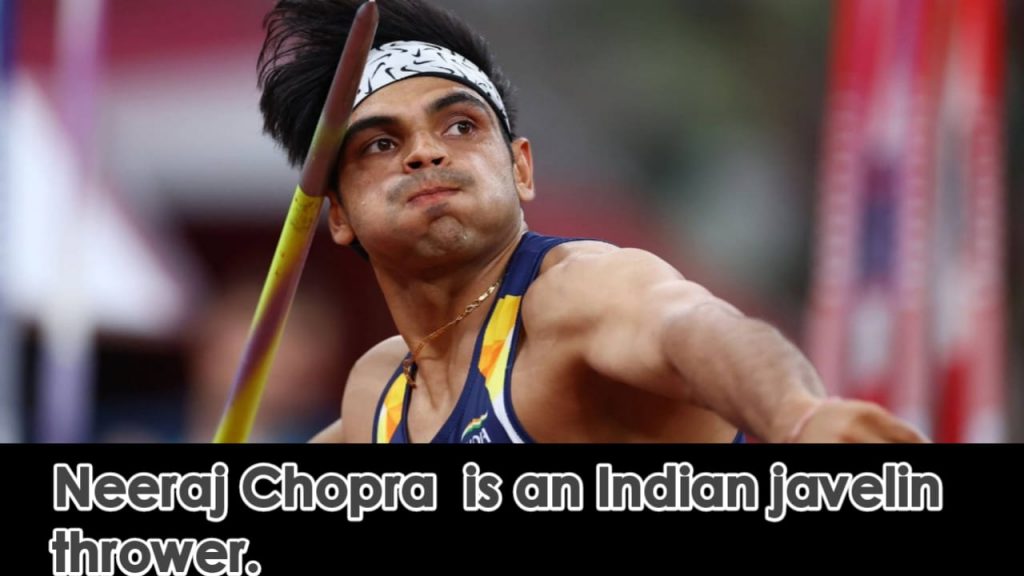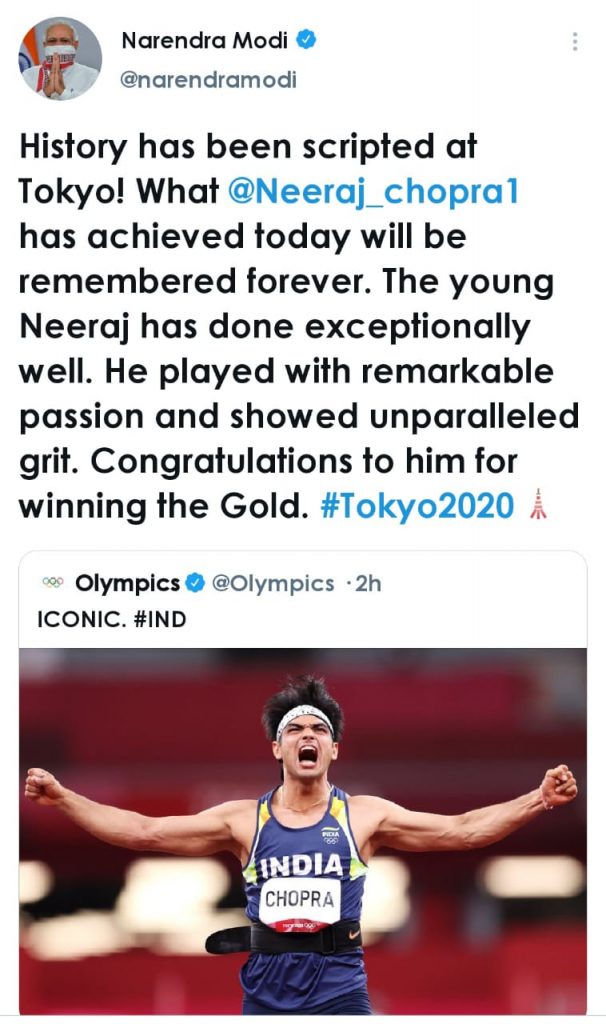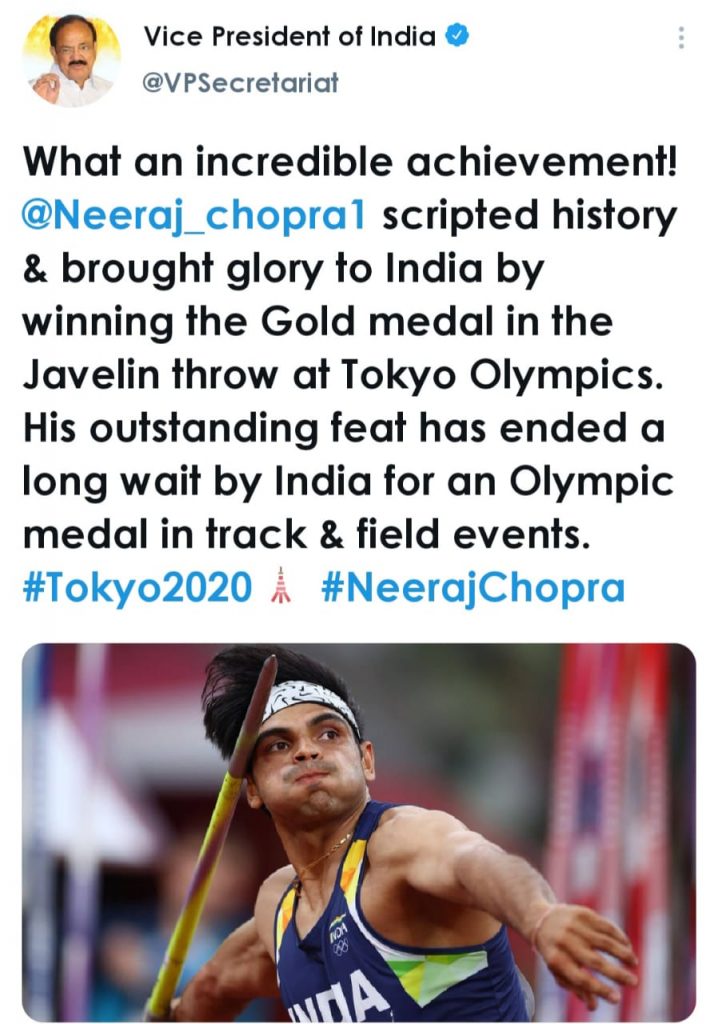Hello friends, the moment India was eagerly waiting for because you know we had 6 medals in the entire Tokyo Olympics so far because recently Bajrang Punia also got a Bronze medal here. But till now not a single gold medal had come from the Tokyo Olympics. But finally, here we can see the golden throw: Neeraj Chopra wins India’s first gold in men’s javelin throw at Tokyo Olympic now breaks India hundred years jink. The person from whom you are expecting the most has shown us the gold medal and break the records. The javelin where it is played has a full run-up of the dimension of space 30 m to 36 m and a width of 4 m. The javelin stick for men is 800 grams while for women it is 600 grams.
Neeraj Chopra’s success is assigning great social importance across the nation with Neeraj Chopra securing the first position with a distance of 87.58 m in his second attempt and also became the second-ever individual gold medallist in the country. And India won the gold medal in the 2008 Beijing Olympics, this gold medal was won by Abhinav Bindra in 10m Air Rifle Shooting.
While In the current Olympic report the second place has to taken by Yakub Valdez threw 86.67 m and another player from the same country won bronze with 85.44 m.
Haryana Chief Minister has congratulated Neeraj Chopra, the son of India. After getting the final result the Tricolour flag was hoisted in Tokyo. Haryana’s son Neeraj Chopra has created history today Chief Minister said.
The two athletes such as Neeraj Chopra and Shivpal Singh are the two prime javelin throwers in India. Neeraj Chopra’s personal best is 88.07 m at the National level and 88.06 m at the International level, which helped Neeraj Chopra to win the gold medal at the 2018 Asian games.

Indian army ADG General Bipin Rawat said that Neeraj Chopra has proven the correct proverb that when there is a will there is a way. He has executed the Indian armed forces and the nations feel proud like many distinct Olympians who have created history in Tokyo 2020. We are confident you will continue to reach greater heights in the year to follow. General Bipin Rawat further added that Neeraj Chopra’s achievement will inspire and motivate distinct sportspeople to pursue success and bring bigger laurels and a greater honor to our country.
Athletes Men’s javelin throws (final result)
| Countries name | Javelin throwers | Score |
| India | Neeraj Chopra | 87.58 m |
| Czechia | Jakub Vadlejch | 86.67 m |
| Czechia | Vitezslav Vesely | 85.44 m |
| Germany | Julian Weber | 85.30 m |
| Pakistan | Arshad Nadeem | 84.62 m |
| Belarus | Aliaksei Katkavets | 83.71 m |

India’s total Olympic medals so far
| Games | Athlete | medal |
| Wrestling 57 kg | Ravi Kumar Dahiya | silver |
| Weight lifting (49 kg women) | Mirabai Chanu | silver |
| Women single badminton | PV Sindhu | bronze |
| Hockey | Indian hockey team | bronze |
| Wrestling | Bajarang Punia | bronze |
| Women’s welterweight boxing | Lovlina Borgohain | bronze |
| Javelin thrower | Neeraj Chopra | Gold |
Rules to follow javelin
For the throw to be calculated, they must not turn back to the landing part at any cost until the throw and landing are finished. Further, the javelin must land tip first. The Javelin required only making a mark on the ground and not sticking in or breaking grassroots. And the athlete must also stay behind the foul line while throwing and the javelin must be above the shoulder through the throwing process.
How the scoring made in Javelin
To put it simply, the athletes who throw the javelin the furthest throw win. If there is a tie, the person whose next best throw went the furthest wins. If still fixed after this, then measure the third-best space of the fixed athletes, and the athletes with the greatest third-best space are awarded the higher place.
History of Javelin
Javelin is believed to have been introduced during the ancient Olympics games as part of the pentathlon in 7o8 BC.
It was further divided into two competitions where one winner would be determined by the distance covered by the spear and the other for accuracy in hitting targets. The art of throwing javelin-like poles re-emerged in Germany and Sweden in the 1870s.

It was in Sweden that these poles were remodeled to look somewhat like the modern-day javelin. Soon after in the sports spreading to other countries and rules began to evolve. Initially, Javelins were thrown without a run-up and in the 1890s limited run-ups were introduced. It has been a segment of the current day Olympic Games program since 1908 for men and 1932 for women.
BIHAR SCHOOL REOPENING NEWS 2021





